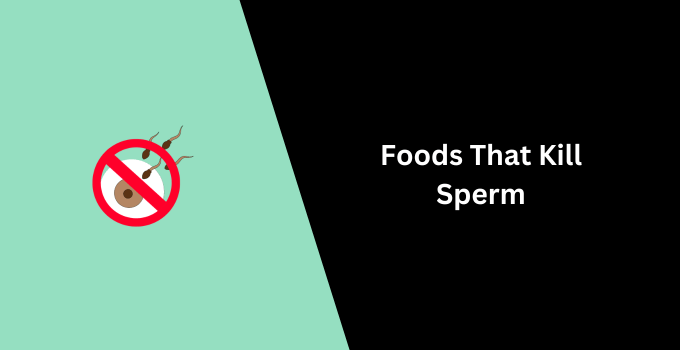The consumption of certain foods negatively affect male fertility by reducing sperm quality and quantity.
Studies have explored how dietary elements can disrupt the normal operations of the male reproductive system, resulting in decreased sperm production and male infertility.
Having healthy sperm from a male helps a woman conceive by ovulating a healthy egg to get pregnant.
If you want to have healthy sperm, you should avoid certain everyday foods that negatively affect your sperm count. In this guide, you will learn about the 5 major foods that destroys sperm production and also discover healthy food options that promote the reproduction of healthy sperm cells.
1. Caffeine Foods
Consuming excessive amounts of caffeine foods can lead to a decline in your sperm count and motility, affecting fertility. It’s crucial to understand the impact on sperm health when you indulge in that extra cup of coffee or reach for a caffeinated soda.
Caffeine consumption can lead to oxidative stress, which negatively impacts sperm health. Oxidative stress occurs when there is an imbalance between free radicals and antioxidants in the body, leading to cell damage. This damage can impair the cells in sperm, reducing their functionality and decreasing fertility chances.
When caffeine is consumed alongside alcohol, the adverse effects on sperm health are amplified. The combination of these substances raises oxidative stress levels even more, contributing to a further decline in sperm quality and a reduction in fertility potential.
Limiting yourself to 200mg of caffeine daily is a proactive step towards preserving sperm vitality.
2. Alcohol
Alcohol consumption significantly impacts male fertility, affecting various aspects of reproductive health. Regular or excessive drinking can lead to multiple risks associated with male fertility such as lowered semen quality, decreased semen volume, reduced testosterone levels, and difficulties with ejaculation.
Drinking alcohol may cause a reduction in semen quality, which includes a decrease in sperm count, motility, and morphology. Additionally, alcohol can lower the volume of semen during ejaculation, which may further delay fertility capabilities. These factors collectively demonstrate the negative effects of alcohol on male reproductive health.
3. Processed Foods
Including processed foods destroy your sperm count and motility. It’s crucial to understand that what you consume has a profound impact on not only your overall health but also your reproductive capabilities.
Processed meats such as hot dogs, bacon and hamburgers: contain additives and preservatives that are linked to decreased sperm quality. The presence of additives, preservatives, and unhealthy fats in processed foods can negatively affect sperm health. This may impact an individual’s reproductive capabilities by compromising the quality of sperm.
It is important to consider dietary choices and their effects on reproductive health. Opting for foods with fewer processed ingredients may support better sperm quality and overall reproductive health.
4. Fried Foods
Fried foods are high in trans fats, which are linked to lower sperm count and reduced motility. Trans fats in fried foods can disrupt the reproductive system, similarly to the effects seen with processed meats. Regularly eating fried foods has been associated with decreased sperm health, potentially increasing the risk of infertility.
To get healthy sperm production focus on a diet rich in fresh, whole foods to provide your sperm with the best possible environment for fertilization.
5. High Fatty Foods
Diets high in saturated fats are linked to poor sperm quality. These fats can lead to obesity, which negatively affects sperm structure and development. Obesity can alter the environment around the testes, raising temperatures and damaging sperm health.
Consuming a high-fat diet can disrupt the balance of bacteria in the gut. Healthy gut bacteria are crucial for proper sperm production and movement. When this balance is upset, it can result in poor sperm function.
Eating too many saturated fats while not consuming enough polyunsaturated fats can change hormonal levels. This includes a reduction in testosterone, which is essential for sperm production. Lower testosterone levels can lead to decreased sperm quality.
How Does Certain Food Affect Sperm Health?
Certain foods can negatively impact sperm health and fertility. Consuming foods high in saturated fats, trans fats, and processed sugars may reduce sperm count, movement, and overall sperm quality.
Is There Any Scientific Evidence of Foods’ Effect on Sperm Production?
Yes, there is scientific evidence that certain foods and dietary patterns can affect sperm production and quality. The study by Human Reproduction Update found that healthy diets rich in nutrients like omega-3 fatty acids, antioxidants, and vitamins were associated with better semen quality, while diets high in processed meats, sugar-sweetened beverages, and full-fat dairy were linked to poorer sperm parameters.
Is the Foods Impact on Sperm Health Permanent or Temporary?
No, the impact of foods on sperm health is not permanent, but rather temporary and the effects are reversible if the diet is changed.
What Foods Increase Sperm Count?
You can boost your sperm count by incorporating healthy foods into your diet. If you want to know what foods increase semen good news is that by choosing the right food items, a man is considered more likely to maintain healthy sperm production. Studies show that men who ate fish loaded with high in zinc and Omega-3 fatty had better sperm motility.
- Zinc-packed foods like oysters and pumpkin seeds are essential to your sperm-supportive diet.
- Omega-3 fatty foods like walnuts, tuna packed with nutrients an greatly improve your sperm quality and increase semen production.
Affiliate Disclosure: Some of the links in this post are affiliate links, which means I may earn a small commission if you make a purchase through those links. This comes at no extra cost to you. Thank you for your support!



